First of the Month | October 2022
After a long wait, members of the Amos team were recently reunited in person with our partners and friends Karunalaya in Chennai, India. For some of us, it was our first visit. For others, a welcome return. Karin Joseph writes.

Hitting gender-based violence for six in Chennai
After a long wait, last month, members of the Amos team were finally reunited in person with our partners and friends Karunalaya in Chennai, India. For some of us, it was our first visit. For others, a welcome return.
Katie Hagley, Head of Community Engagement at Amos, visited Karunalaya for the first time this trip. She shared a few of her reflections:
“Arriving in India is an assault on the senses; it is life in technicolour with everything turned up 50 per cent: the vibrancy of colours, the sheer number of people, the traffic, the sounds, the smells and the incredible food — oh my, the food — but that is a whole other discussion.
After speaking about the work of Karunalaya for the last eight years, I knew in my head that the holistic way the team works with pavement-dwelling communities and young people is fantastic. Still, nothing prepared me for the breadth and depth of their work.
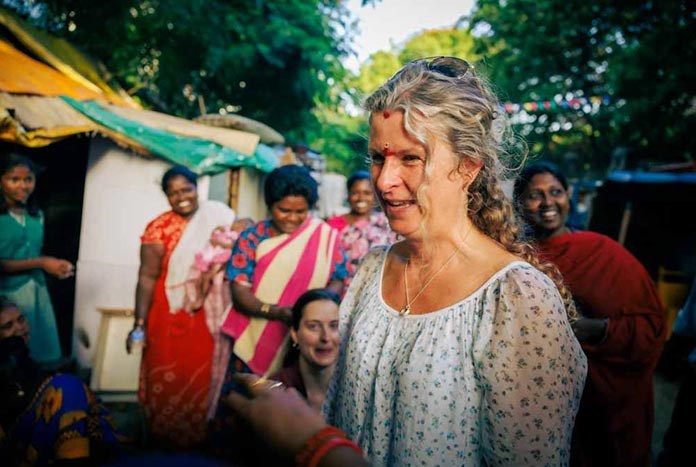
Technicolour: Amos Trust’s Katie Hagley visiting Karunalaya in India, September 2022
We heard from so many young people who, despite the most difficult of circumstances, living on the streets with their families, are now doing Bachelors and Masters degrees thanks to Karunalaya’s support to help them stay in education. We heard about the camps young people go on that bring them so much joy and help them build their resilience to cope with their situations.
We met girls who, thanks to counselling, have been able to keep going with their education despite difficult circumstances. We sat in a circle on the pavement with girls aged 10-17, learning about the impact of child marriage and the importance of education, and heard the stories of those Karunalaya has helped to avoid marriage at a young age.
Arriving in India is an assault on the senses; it is life in technicolour with everything turned up 50 per cent...
We met girls who challenged stereotypes through sport. The girls’ football team will soon head off to Qatar to participate in the Street Child World Cup and those training to join in the Street Child Cricket World Cup in India next year, which Karunalaya will co-host.
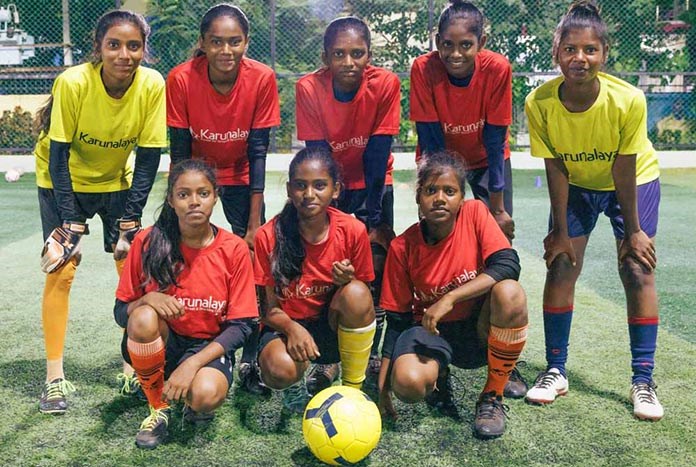
Street Child United: The Karunalaya girls’ football team will soon head off to Qatar to participate in the Street Child World Cup
Then there was the staff: at the railway stations intervening before young children arrive on the trains and fall into the wrong hands; leading the incredible women’s groups in the communities to focus on gender-based violence, and supporting the pavement dweller’s associations in demanding their rights to better access to toilet facilities, identity cards, permanent dwellings or licences to work.
And all of this, alongside, what many told us, was the incredible practical support they received from Karunalaya during lockdown — at its peak, the team were cooking and distributing 1000 meals a day.”
Gender-based violence on the streets
Stemming the tide
Although bustle and chaos have returned to the streets of Chennai, the impact of the COVID-19 pandemic and strict lockdowns on pavement-dwelling communities has had a long tail. The lockdowns, in particular, meant that daily wage earners in pavement dwelling communities lost incomes overnight, and mothers struggled to provide food for their families.
Karunalaya distributed thousands of meals and food packs and supported communities in sharing their resources. They intervened when the public toilets, a vital necessity for the pavement-dwelling communities’, were left fully closed by the authorities during lockdowns, successfully advocating for their reopening.
Schools were closed for the best part of two years, only fully reopening earlier this year. Karunalaya worked tirelessly to ensure that girls kept participating in supplementary classes whilst schools were closed, recognising that as families begin to struggle, it’s daughters who are taken out of education.
Although bustle and chaos have returned to the streets of Chennai, the impact of the COVID-19 pandemic and strict lockdowns on pavement-dwelling communities has had a long tail.
Life for girls and women on the streets was never one characterised by safety or equality, but the last two years have meant women and girls have been engulfed by unprecedented challenges. As the pressure on families built up, it erupted into domestic violence in many cases. Alcoholism, already a big community challenge that women reported to Karunalaya, increased with many more men turning to alcohol to cope with the stress of the lockdown and the overnight loss of income. This in turn, contributed to a rise in cases of gender-based violence against women at the hands of their husbands.
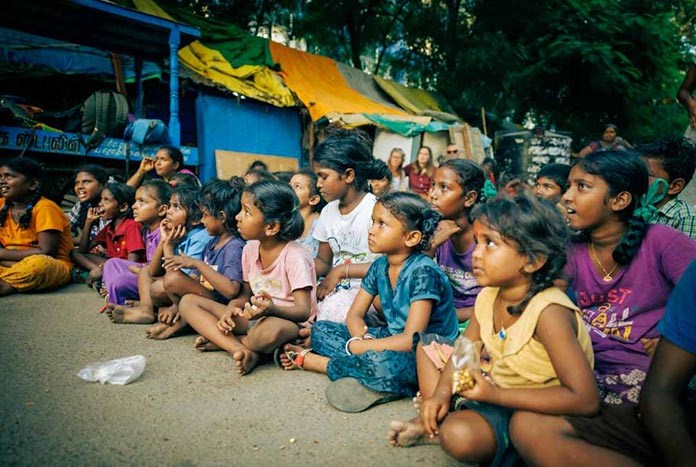
Education: It’s the girls who are taken out of school when families find it hard to make ends meet
Several Karunalaya staff members and women on the streets themselves told us that the rates of suicide among women in pavement-dwelling communities had risen noticeably. The toll of decades of struggle living on the streets, providing for families, and in many cases, violence at the hands of abusive husbands, proved, in the most devastating way, too much for many women to bear.
In 2020, the Niruthuda movement sprang up as domestic violence rates soared during the lockdowns. It came from the women in one of the fishing communities near the port when they gathered together to do something — anything — to stem the rising tide of violence they were experiencing at the hands of men. Bhuvana, Karunalaya’s outreach programme coordinator, leads the coordination of the women’s movement in partnership with women leaders in the communities.
“The main reason Niruthuda started,” Bhuvana explains, “is that women needed to be empowered and gain an understanding of what is happening in their communities. Women are the most powerful weapon in the community — they must come forward and find solutions together.”
Several Karunalaya staff members and women on the streets themselves told us that the rates of suicide among women in pavement-dwelling communities had risen noticeably.
Niruthuda is a forceful word, and its use shocked men in the community who asked why they chose it as it was not at all respectful or deferential. Translated from Tamil, it is a way of saying “stop it” — but explicitly talking to men, so it literally translates into “man, stop it”, The women were insistent in their choice of Niruthuda for the movement and stuck to their guns, and have been active with hundreds of members across four communities for two years now.
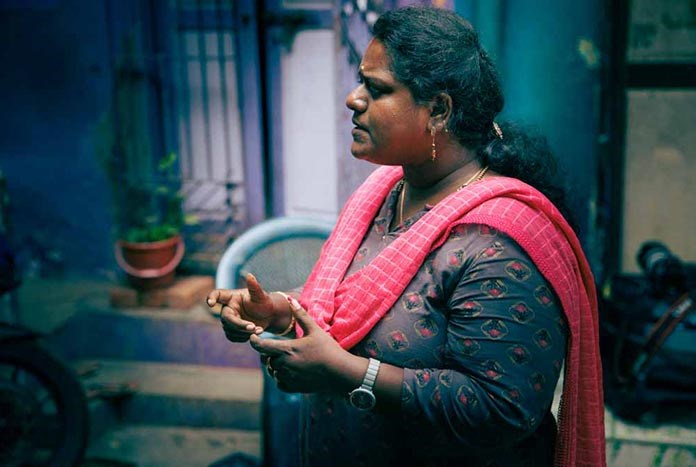
Niruthunda! Bhuvana from Karunalaya talks to a pavement-dwelling community. She said, “... women needed to be empowered and gain an understanding of what is happening in their communities.”
Each community group meets monthly with Karunalaya’s guidance, facilitation, and training. As a result, women attend leadership training from Karunalaya, visit police stations together and petition them to take gender-based violence seriously, and educate other women in their communities about their legal rights. The women we met are committed to creating a safer future for themselves and their daughters. Karunalaya is the perfect partner for these women in their mission, having equipped pavement-dwelling communities to advocate for their rights for over 25 years.
Priya (name changed), 18, lives in one of the pavement-dwelling communities Karunalaya works in. Karunalaya’s staff have been working with Priya since she was twelve. Priya’s mother died, and her father doesn’t provide care for his children. She has two older brothers, but they have not been supporting the family either.
Priya said, “It is very hard to sleep at night. I have to walk a long way to the public toilets, but they are often locked. They are not safe places anyway. I am scared because there is so much violence on the street. When my mother was alive, I felt safer. But now it’s up to me to try and look after my two younger sisters.”
Karunalaya is the perfect partner for these women in their mission, having equipped pavement-dwelling communities to advocate for their rights for over 25 years.
Unsurprisingly, Priya dropped out of school for a time due to her grief when her mother died. Still, Karunalaya’s counsellors and community outreach workers supported her and helped her rejoin school when she was ready so she could finish her crucial 12th standard exams.
Now that Priya has graduated from school, a considerable achievement given the tumultuous time she has had, she is looking ahead to university and has a place to study for a BA in History; however, before starting her studies, she is also working long hours at an import shop in the port area to earn some money to support her younger sisters, as the responsibility for their care has fallen to Priya.
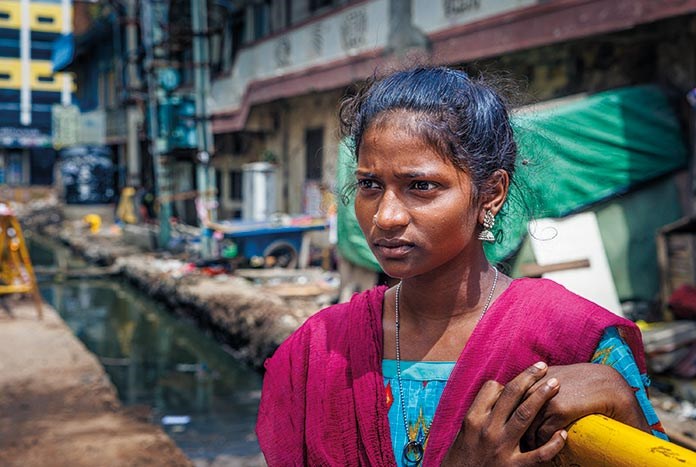
Priya: “It is very hard to sleep at night. I have to walk a long way to the public toilets, but they are often locked. They are not safe places anyway.”
Karunalaya is enabling her two younger sisters to move into the girls’ shelter so that the burden of care lifts from Priya’s shoulders. Karunalaya’s team will continue to support her through her university studies. Priya wants to be a lawyer. She explains, “we have always been discriminated against because of the community we’re from. This isn’t right.”
It is, of course, fantastic that in this situation, Karunalaya can offer sheltered accommodation to Priya’s sisters, so they can grow up in a safe and nurturing environment, enjoying sports and cultural activities and finishing school just like all children have the right to. But shelter at Karunalaya isn’t an option for all the girls Karunalaya works with on the street, even though life on the streets is not safe for any girl.
So, Karunalaya’s community outreach teams are a vital support. They are present in pavement-dwelling communities daily, building deep trust and rapport so people can turn to them in times of need. They work with families to increase awareness of children’s rights. They offer residential camps where children can get away from life’s challenges on the streets, have a fresh perspective, talk to Karunalaya counsellors in a different context, and relax and have fun as children. They support families to keep their children in school, especially girls whose education is not highly valued or prioritised by many families.
Karunalaya is enabling her two younger sisters to move into the girls’ shelter so that the burden of care lifts from Priya’s shoulders. Karunalaya’s team will continue to support her through her university studies.
Karunalaya also runs Theatre of the Oppressed sessions on the streets, empowering women and children to speak out and find solutions to the situations they face in their own lives. We witnessed a Theatre of the Oppressed session in action, as Katie shares more about below.
“On our final day in Chennai, we returned to the Beach Station community, again greeted with incredible warmth by the women we had met just a few days before. I joined them to have my hair done, and then we sat together as the police closed the road, ready for a Theatre of the Oppressed session run by staff at Karunalaya.
I had learnt about Theatre of the Oppressed but had never seen it in action. Members of the community sat watching a hard-hitting sketch about child abuse performed by the Karunalaya team. They were then invited to join in as the play was performed again, coming forward to stop proceedings, take on a role and show what could be done differently to prevent the awful scenario from happening to the girl in the story.
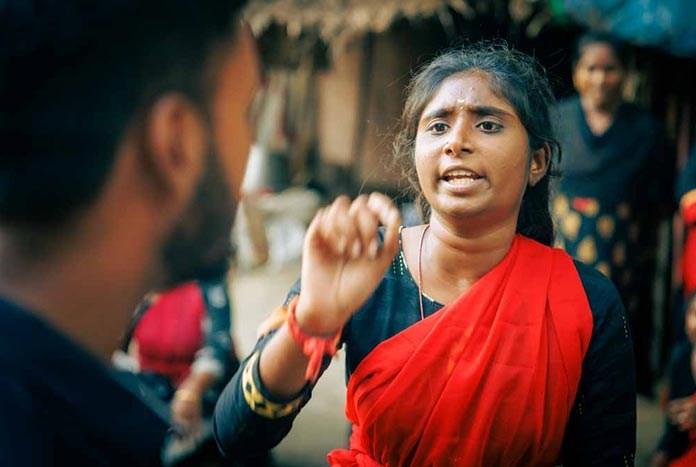
Hard-hitting: Theatre of the Oppressed, live from the pavements of Chennai, India
Women and children came forward with their ideas, and it was so powerful to see the changes people made and the confidence with which they did so. I was especially impressed by a young girl of about 11 years old, whom we had met previously, who went forward wearing impressive mirrored sunglasses (having lost sight in one eye after being attacked by a cockerel whilst sleeping on the street).
She shouted for the play to stop before taking to the stage, speaking loudly and clearly and telling other children they shouldn’t let the would-be abuser into the house when her parents were not there: changing the story to loud applause.”
Karunalaya’s work is always urgent, but results take time. Karunalaya has been rooted in pavement-dwelling communities in Chennai for over 25 years now. The impact of their community development work on individuals and communities is clear, but the fruits of their labour are sometimes not seen until the next generation.
As we sat with Paul waiting for the Theatre of the Oppressed session to start, he was surrounded by children chatting with the women, as they updated him on the happenings in their community. While conversing with the women leaders, one found out I was getting married, and she enthusiastically wished me a happy marriage. She told us that she’d gotten married at 15; she was 28 now with three young daughters. Paul asked her, “how about your daughters? What are your hopes for them?” Immediately she responded, “absolutely, they’re staying in school. I know now that for girls to get married early — it’s not good; they must finish their education.”
She shouted for the play to stop before taking to the stage, speaking loudly and clearly and telling other children they shouldn’t let the would-be abuser into the house when her parents were not there: changing the story to loud applause.
All of Karunalaya’s community-based interventions play a specific role in their long-term approach to empowering individuals and communities on the streets. Over the last decade, sport has also played an increasingly vital role in Karunalaya’s strategy to empower girls and challenge the gender norms that dominate girls’ lives.
Sport as a tool for gender equality
Cricket is India’s first love. Games are played in the streets everywhere you look, and parks are taken over on Sundays with games lined up back to back. And, almost without fail, the fun you can see being played in public is populated only by men and boys. Girls are nowhere to be seen.
Karunalaya is set on changing this. At their nightly practices, girls flood in every evening after school to play cricket in the nets. In pavement-dwelling communities, sport is seen as the boys’ domain; girls are kept at home and rarely given the freedom to attend practices or games. As Paul Sunder-Singh explains, “Playing sport is a big taboo for girls — many communities think that the place for girls is in the home. But it’s a mystery to me why families think girls should stay indoors when so much abuse occurs in the home.”
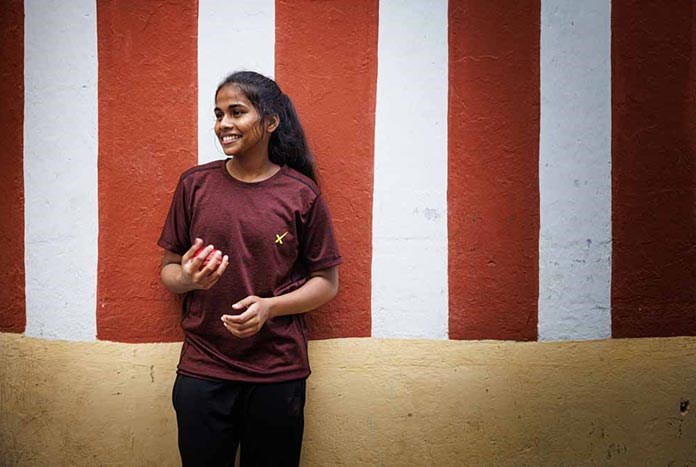
First love: 17 year-old Monisha on Wall Tax Road with her cricket ball
For the past eight years, Karunalaya has been using its participation in Street Child World Cups (cricket, football and athletics events) to amplify the voices of young people on the streets, challenge perceptions, and increase girls’ access to sports in their daily lives.
On Wall Tax Road, a pavement-dwelling community of around ninety families, Monisha, 17, lives with her mum and siblings. We visit on a Sunday morning; the street is sleepy, and few people are around. Monisha, her brother, and some of his friends are playing cricket in the street. The road is narrow, and everyday life continues around the game; auto-rickshaws manoeuvre round the stumps, motorbikes whizz past while Monisha bats and a man pulls a cart piled high with tiffin tins.
It is a far cry from the manicured lawns and professional set-up of Lord’s Cricket Ground, where, three summers ago, Monisha was batting in the winning Indian team which went on to take the inaugural Street Child Cricket World Cup. But, then, she was also batting for girls’ need for protection on the streets, as she spoke out powerfully at events in the UK.
But it’s not only cricket that Karunalaya uses to change the narrative for girls on the street. Later this month, on 11th October, it’s International Day of the Girl. On that day, Karunalaya’s girls’ football team will be kicking off in Qatar on the first day of the 2022 Street Child World Cup, the third time Karunalaya has represented India in the competition.
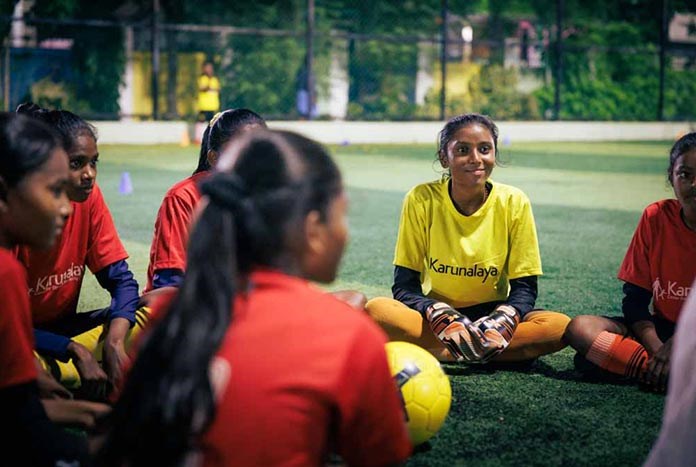
Qatar-bound: The Karunalaya Street Child World Cup football team
Ishwari played football in 2018 for India at the Street Child World Cup in Moscow. One evening, we met the team preparing to travel to Qatar as they trained under floodlights at a local pitch after school. Ishwari will be travelling to accompany the team as a young leader. She shared with the 2022 team at the practice about what to expect and her experiences growing up on the streets and beginning to play football with Karunalaya.
“While playing in the fields or the community, people would watch and stare and ask, “why are you playing? You are not very good.” Some girls would play in these clothes (she points at her football kit). Boys and men looked at us in a bad way, so we’d feel awkward. Because of this, our parents did not like us to play.”
Karunalaya’s sports programme means girls like Ishwari can now progress and continue playing football and represent India as Ishwari did in 2018. “When I went to Moscow, my family still did not know the value of football; after we participated, they became very proud and told everyone; even my brothers were inspired.”
“While playing in the fields or the community, people would watch and stare and ask, “why are you playing? You are not very good.” Ishwari — part of Karunalaya’s Street Child World Cup team.
She had some advice for the girls preparing for Qatar: “Other teams will be strong, so you need to be stronger!” But football was only a part of the whole experience. Speaking out about the team’s demands was transformative for Ishwari: When entering the stadium, I was afraid of the big crowd. But after I started to speak, it was the best experience ever. I learned how to make demands without being afraid.”
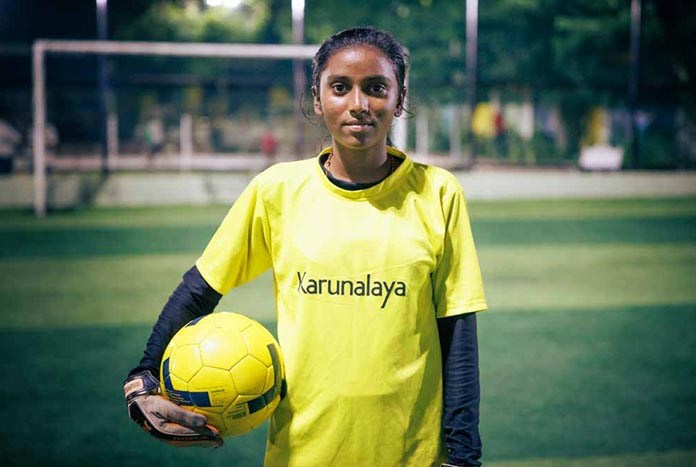
Guarding the goal: The team will be playing football but also making demands for street children's rights
The sports offered at Karunalaya are far more radical than they may seem at first glance. The programmes create the space for girls to experience freedom, to step out of the confines of the oppressive gender norms they, their mothers and grandmothers, have existed within for generations. The transformation begins within girls themselves, as they become more aware of their potential, talents and dreams. Then, it spreads to families and communities, who begin to shift their perceptions of girls and what opportunities should be equally available to their daughters as much as their sons.
Karunalaya’s strategy to tackle gender inequality and gender-based violence in communities on the street works on several levels:
- they address the impact of gender-based violence on girls’ lives
- they empower girls to know their rights and to change their perception of themselves
- they transform the way society sees and treats girls and young women
- they equip pavement-dwelling communities to claim their rights and address issues like gender-based violence.
Sport forms a vital part of Karunalaya’s approach, alongside the the Niruthuda movement, the girls’ shelter, residential camps, children’s clubs, creative approaches to addressing child marriage and child labour, and the promotion and support of girls’ education.
Karunalaya wants to use the 2023 Street Child Cricket World Cup to launch their campaign — Hit Gender-Based Violence for Six — and we want to help them have the most significant impact they can possibly have.
They hope to use the opportunity of being both the defending champions and the host nation to open up more conversations about gender-based violence and challenge gender inequality in the communities they work in. This will involve:
- education and awareness sessions for girls and young women on their rights to live free from violence, to remain in education, and to have access to sports
- community events (including cricket matches) to engage men and boys in the conversation about ending gender-based violence
- Niruthuda campaign actions and young women receiving leadership training
- continued engagement with the police that operate in these communities, sensitising them to take gender-based violence cases seriously
- getting press coverage to raise awareness of their campaign, and much more.
Over the next year, we will share more about Karunalaya’s preparations for the Street Child Cricket World Cup and their campaign against gender-based violence in Chennai — and we know that you will be keen to support them on their journey.
You can get involved by supporting our appeal or helping us raise awareness and vital funds in your area, perhaps by inviting us to speak about the incredible work Karunalaya is doing, holding a cricket match yourselves or getting your local school involved.
Please get in touch with [email protected] if you would like to help Karunalaya hit gender-based violence for six!
A little more
Words Of Hope E-news
Sign up to receive our regular ‘Words Of Hope’ emails and keep up to date with all the latest Amos news and information, including details of our trips and events, news from our partners around the world and all of our campaigns.
Online reflection
Join us every Tuesday at 5pm for ‘Words Of Hope’ — our online reflection. Simply click here to join us a few minutes beforehand.





